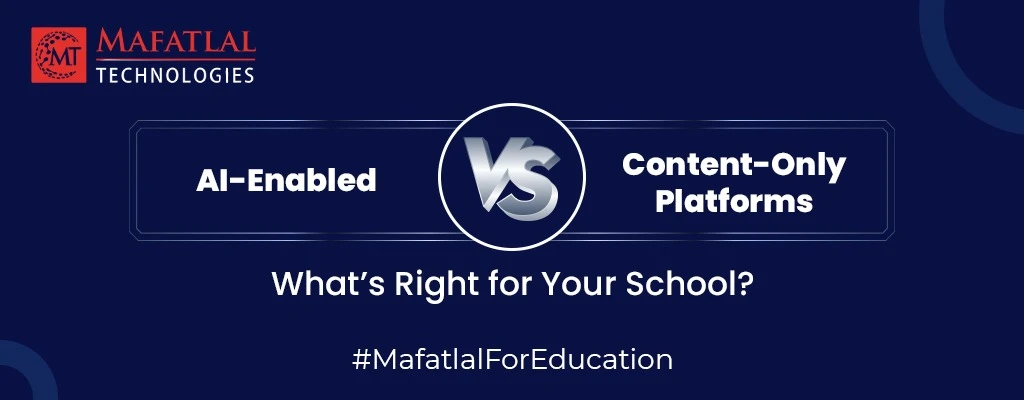It’s a Monday morning, and a teacher has begun a lesson on algebra. Half the class understands the lesson and finishes their assessment quickly, while others seem clueless about where to begin. Meanwhile, parents are eagerly waiting to know their children's performance.
In such a scenario, a big question arises: Is access to content enough, or do schools need intelligence that adapts to every learner?
An AI-enabled platform can identify patterns early and provide timely support, thereby helping students stay engaged, correct mistakes, and achieve their full potential, whereas content-based learning platforms miss this.
The Challenge: Content Isn’t Always Connection
Schools use content-based learning platforms to access huge libraries of videos, notes, and assignments. They are helpful, but they don't always answer the bigger question: Is every student learning? Who needs more help?
How do we turn content into real understanding?
It can be challenging for teachers to know who has grasped a concept and who needs extra practice. Students may absorb information, but their engagement and ability to apply it can vary. Meanwhile, parents often wait for report cards to gauge their children’s progress.
Today, schools need systems that go beyond simply delivering content. With NEP 2020 emphasizing competency-based, inclusive, and continuous learning, they require platforms that can adapt, track progress, and support each student’s learning journey in real time.
The Solution: AI-Enabled Platforms
An AI-enabled learning platform is more than a digital library. It’s like a co-teacher who works quietly in the background, supporting teachers, students, and parents.
- For teachers → AI in education provides adaptive lesson plans, instant analytics, and insights into classroom performance. This means less guesswork and more time for creative instruction.
- For students → Personalized learning paths, gamified activities, and peer collaboration make lessons engaging and tailored to each learner’s pace.
- For parents → Clear updates and progress dashboards ensure transparency and continuous involvement.
In simple terms, AI-enabled learning platforms for schools bring intelligence into everyday teaching and learning.
Relatable Case Studies: Bringing the Difference to Life
Scenario 1: Content-Only Platform
A teacher shows a video to students on the concept of ‘Water cycle’. Some students understand it while others re-watch and are still not clear about the concept. Thus, these gaps remain hidden until exams.
Scenario 2: AI-Enabled Learning Platform
The same topic is assigned through an AI-enabled learning platform. The system tracks comprehension in real-time and shows the teacher a dashboard of who needs help. It suggests quizzes and remedial worksheets for those students. Within a few days, the teacher sees an improvement in understanding, all without adding extra workload.
This is how an AI-enabled platform improves school education in practice—by turning content into meaningful learning.
With Mafatlal’s AI-enabled learning platform, these improvements go a step further. It offers multilingual support, adaptive lesson planning, and real-time dashboards that empower teachers while helping students build confidence, retain concepts better, and actively participate in their own learning journey.
Local Relevance: Why This Matters for Indian Schools
The classrooms in India usually have 40-45 students and several learning levels in the same room. Teachers work hard to complete the syllabus while giving personal attention to every child.
At the same time, NEP 2020 is pushing schools to move beyond rote learning and adopt competency-based, continuous assessment methods. In such a context, platforms designed only to deliver content often fall short.
Therefore, schools need AI-enabled platforms that support multilingual classrooms and help educators track holistic growth without adding extra burden.
Let’s discuss a few of the reasons that state why schools need AI-enabled learning platforms:
- Large class sizes → AI helps teachers manage diverse learners without losing personal connection.
- Different learning levels → AI personalizes at scale, ensuring every child gets the right support.
- Multilingual needs → AI platforms deliver learning in multiple languages, making content inclusive.
- NEP 2020 alignment → AI supports competency-based, formative, and holistic assessment—something content alone cannot achieve.
Choosing the Right Path Forward
Think of it this way: platforms that only provide content are like bookshelves full of information, while AI-enabled platforms act like mentors, guiding each student through their learning journey.
Schools don't need to get rid of content; they need to make it smarter. AI in the classroom enhances teachers’ understanding, supports teachers, and keeps parents informed.
AI-enabled learning platforms for schools make sure that no child is left behind in classrooms where every child should be seen, heard, and guided.
The Mafatlal Advantage: Beyond Normal LMS
At Mafatlal Technologies, we believe every child deserves to shine, every teacher deserves the right support, and every parent deserves clarity. AI isn’t about replacing human connection; it’s about strengthening it.
Most LMS platforms simply store content and track assignments. Mafatlal's AI-enabled platform is NEP 2020 compliant and supports adaptive and multilingual learning for diverse groups.
Unlike traditional LMS, Mafatlal’s AI-enabled platform is a teacher-first concept that provides real-time dashboards, dynamic lesson planning, peer-graded evaluation, and AI-assisted recaps.
Plus, it integrates parental dashboards, ensuring schools, teachers, students, and parents all stay connected.
Ready to see how Mafatlal’s AI-enabled learning platform can transform your classrooms? Book a demo at Mafatlaltechnology.com
You may also read - AI-Enabled Platform vs Traditional LMS: Choosing the Right Digital Companion for 21st-Century Classrooms

